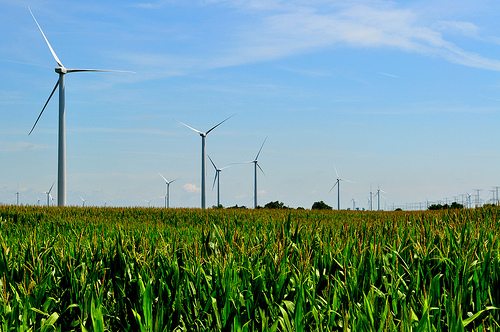

Economy
Autumn statement: sustainable investment industry calls on Osborne to back renewables
The sustainable investment industry has called on George Osborne’s autumn statement to show an awareness of long-term megatrends such as climate change and resource scarcity while delivering greater certainty to renewable energy investors.
The chancellor’s speech at 11.15am on Thursday serves as an update on the government’s economic plans. His 2012 address included an outline of the coalition’s gas strategy, and was criticised by many for being too focused on the “short-term”.
However, after a year which has seen a 2030 decarbonistion target voted down by MPs and the introduction of government measures that could make it easier for communities to reject local wind power projects, members of the sustainable investment industry have asked Osborne to look at the bigger picture as to why clean energy is crucial to the long-term sustainability of the UK’s economy.
“Investors need a clear, consistent and stable policy framework to encourage them to deliver, for instance, the £110 billion in electricity generation necessary by 2020 to ensure the lights don’t go out in the UK”, said Caroline Escott, head of government relations at the trade body the UK Sustainable Investment and Finance Association (UKSIF).
“A necessary pre-requisite for this greater investor certainty is a signal that the Treasury understands the impact that long-term megatrends like climate change and resource security can have on economic growth. So what we would really like to see in the autumn statement is a commitment from the chancellor to reinstating the proposed resource depletion review, which the Treasury previously failed to back despite support from other major government departments.”
UKSIF, along with major investors such as Aviva, WHEB, Impax and the Co-operative Asset Management, signed a letter in July – sent to Andrew Tyrie MP, chairman of the Treasury select committee – calling for a review of resource depletion, climate change and growth, which was blocked by the Treasury in 2012.
“We are concerned that the Treasury is insufficiently taking into account important long-term trends which are already having material impacts on businesses and investment, and are of great potential significance to the UK’s financial stability and the future of its economy”, they wrote at the time.
Escott added that Osborne “should not miss this opportunity to reassure investors that he fully recognises the important and necessary contribution the low-carbon sector can make to a fully-fledged economic recovery.”
Financial services professionals within the sustainability space have also urged the chancellor to rethink his views on renewable energy and environmental issues. He has previously described businesses and individuals in the green world as the “environmental Taliban” and also once famously claimed, “We’re not going to save the planet by putting our country out of business.”
“Given the chancellor’s traditional hostility to environmental technologies and industries, I think some recognition of the importance of this sector to the UK’s economy today and its growing importance in future would be very welcome”, said Seb Beloe, head of sustainability research at WHEB Asset Management, which invests in companies that provide solutions to some of the most urgent sustainability challenges.
“Specific measures to expand the role of the Green Investment Bank, and to buttress efforts to increase energy efficiency (particularly in light of changes to ECO) would also help to shore up an industry which has been battered by recent political discussions.”
This sentiment was echoed by Richard Essex, a specialist ethical and sustainable financial adviser at Grayside Ltd.
Essex said, “There was news yesterday that subsidies for onshore wind and solar were going to be cut whilst offshore wind support will increase. There could be some logic in this, in that offshore wind needs more capital support. The message is however a little mixed.
“What I would like to see from the chancellor are steps towards a consistent, effective approach to renewables, creating the right incentive for industry to take up the mantle, while sending a strong message that renewables can make up an important part of the overall low-carbon mix.”
Meanwhile Mark Hoskin, a partner at London-based financial advisory firm Holden & Partners, said, “My main hope is that the government does not further damage our long-term energy future by attacking renewables for short-term political reasons.”
On Wednesday, a number of environmental and conservation charities called on Obsorne to deliver strong environmental protection policy in his autumn statement.
Further reading:
Autumn statement: green NGOs reveal their wishlist
‘Greenest government ever’ has failed the environment, NGOs say
Attention turns to Lords as Commons votes down energy bill decarbonisation target
British energy consumers deserve more than political football


 Features11 months ago
Features11 months agoEco-Friendly Cryptocurrencies: Sustainable Investment Choices

 Energy11 months ago
Energy11 months agoThe Growing Role of Solar Panels in Ireland’s Energy Future

 Energy10 months ago
Energy10 months agoGrowth of Solar Power in Dublin: A Sustainable Revolution

 Energy10 months ago
Energy10 months agoRenewable Energy Adoption Can Combat Climate Change




























